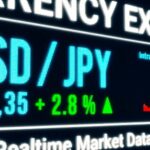EURUSD climbs from 1.1100 as investors absorb disappointing flash Eurozone PMI data for September.
EURUSD rose after finding buying demand near the critical support of 1.1100 in Tuesday’s European session. The major currency pair rose on Monday’s flash HCOB Purchasing Managers Index (PMI) data for September, which weighed on the Euro (EUR) by fueling market expectations that the European Central Bank (ECB) will lower interest rates for the second time in a row at its October meeting.
The PMI Report revealed that economic activity unexpectedly slipped into contraction, falling marginally but remaining above the 50.0 threshold that distinguishes growth and contraction.
HCOB Composite PMI fell mostly due to contraction in the manufacturing sector, which advanced quicker than predicted.
The HCOB Composite PMI fell mostly due to contraction in the manufacturing sector, which advanced quicker than predicted. The service sector continued to develop, but at a slower rate than economists expected.
Weakening Eurozone activity prospects would add to the challenges for ECB policymakers seeking stable market conditions, who are already concerned that pricing pressures will endure. Last Thursday, ECB Governing Council Member Isabel Schnabel stated that sticky services inflation is keeping headline inflation elevated.
In today’s session, President of Deutsche Bundesbank Joachim Nagel will provide A speech at 16:00 GMT. Nagel expected to provide new information on the ECB’s likely interest rate action for the remainder of the year.
Daily Marlet Movers:EURUSD climbs on Tuesday, while USD slides back.
The US Dollar Index (DXY), which measures the Greenback’s value versus six major currencies, is struggling to stay above 100.50. The outlook for the US Dollar remains murky, with traders betting on additional significant rate cuts from the Federal Reserve (Fed) at the November meeting. Financial market participants predict the Fed to decrease interest rates by 50 basis points (bps) for the second time in a row at its November meeting, citing mounting concerns about worsening job growth.
“The Citi strategists expect the Federal Reserve to drop interest rates by another 50 basis points in November, a decision that will be heavily influenced by incoming data, particularly the next monthly jobs report.
On the economic front, the US S&P Global Composite PMI fell slightly to 54.4 from 54.6 in August, as manufacturing activity unexpectedly decreased further. The US S&P Global Services PMI increased at a faster-than-expected rate of 55.4, but fell from its previous reading of 55.7. The government agency stated: “Business sentiment, demand, hiring, and investment subdued by uncertainty surrounding the Presidential Election, casting a shadow over the outlook for the year ahead at many firms.”
Investors are now focusing on August’s US PCE inflation report.
Later this week, the investors will concentrate on the Personal Consumption Expenditures Price Index (PCE) for August, which will be release on Friday. Signs of prolonged pricing pressures would dampen market expectations for a Fed rate drop of 50 basis points. In contrast, soft figures would elicit the same response.









